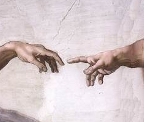Godly Government: In The Beginning
© 07.25.11 By David Eric Williams
 A consideration of human government must begin at the beginning, for, In the beginning God created the heaven and the earth (Genesis 1:1). This universe came into being at God's command and everything that takes place in this realm is under his authority. Thus, all human government is subject to the command of God. Unfortunately, mankind sought autonomy from the very beginning. Adam rejected God's definition of right and wrong and sought to determine such things for himself.
A consideration of human government must begin at the beginning, for, In the beginning God created the heaven and the earth (Genesis 1:1). This universe came into being at God's command and everything that takes place in this realm is under his authority. Thus, all human government is subject to the command of God. Unfortunately, mankind sought autonomy from the very beginning. Adam rejected God's definition of right and wrong and sought to determine such things for himself.
It is impossible to have enduring good government of any kind (self-government, family government, church or civil government) without acknowledging the Eternal Son, as the creator and upholder of all things (Colossians 1:16-17). Yet, why is this important? Why must we embrace the biblical account of creation as absolute truth?
In the first place, unless we are grounded in an absolute, there is no basis for government of any kind. If the universe came into being as a product of time and chance, there is no logic for an unwavering ethic. Therefore, all godless value-systems ultimately end in "might makes right." Without God, there is no reason for men to govern their desires or impulses. Without God, life is merely a survival of the fittest where physical strength and shrewdness become primary assets rather than love, joy, peace, longsuffering, kindness, goodness, faithfulness, gentleness and self-control (Galatians 5:22b-23a). The same may be said about "theistic evolution." If God approves a creative process red in tooth and claw, we are given leave to dominate others (both individually and corporately) through brute strength and cunning. This leaves us with a God who sharply contradicts himself. Are we to care for weak and vulnerable members of society as the Bible says or are we to devour them as nature recommends? We might attempt to overcome this dilemma by suggesting a change of heart in the heavenly Father from ancient times to our own but this is, once more, contrary to the biblical witness. God emphatically states, I Yahweh do not change (Malachi 3:6), a truth reaffirmed in the New Testament with the assurance Jesus Christ is the same yesterday and today and forever (Hebrews 13:8).
Neopagans fare no better. For the most part, neopagan and occult beliefs embrace a Darwinian view of origins. The only difference (typically) is an animistic ingredient. However, this does not solve the problem. Believing inanimate objects and the phenomena of nature are endowed with personal life or a living soul does not serve to ground human action in an unchanging ethic. Instead, it points each man to his own feelings or the collective mind as a guide – both as unstable as water (Genesis 49:4).
Therefore, the only way to have good government at any level is to bow the knee to Almighty God, since it is impossible to exhibit the fruit of self-control (self-government) apart from Jesus Christ and his indwelling Holy Spirit. This is why most of the original 13 colonies required elected officials - in one manner or another - to "profess faith in God the Father, and in Jesus Christ his only son, and in the Holy Ghost, one God, blessed for evermore; and ...acknowledge the holy Scriptures of the Old and New Testament to be given by divine inspiration" (Delaware 1776 Constitution, article 22). These provisions do not reflect an attempt to establish a state religion. Instead, it is a recognition that all government must be exercised under the authority of God. It is an acknowledgment that unless a man is able to govern his own household he is not able to govern others. It is an acceptance that godly government with consistency is impossible apart from a personal relationship with Jesus Christ.
Entire Site Copyright © 2025 By David Eric Williams










